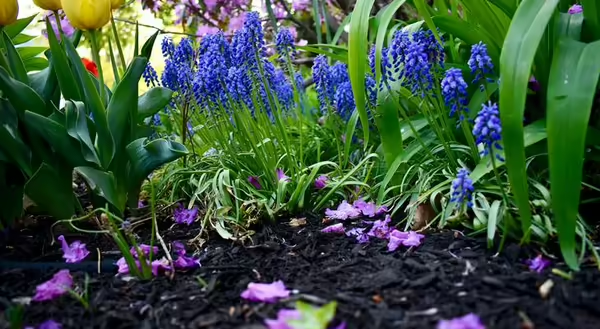
There are many types of mulch that can be used in landscapes and gardens. Here are some things to consider as you choose the mulch that works best for your space.
Benefits of mulch
Even though there are different types of mulch, they do have some important things in common. One of the big benefits of mulch is reduced soil erosion and soil compaction. Mulch also moderates soils temperature keeping it warmer in the winter and cooler in the summer. Another benefit is reducing weeds which can help reduce pesticide use.
While the different types of mulch have some similar benefits, each type of mulch has some things to consider when choosing which one is the best fit for a garden or landscape.
Living mulch
Living mulches which include ground cover or cover crops can compete with resources such as water, light, nutrients, and space. In a space where these resources are limited, especially water, a non-living mulch would be a better choice.
Synthetic mulch
Synthetic mulches would be any materials used for mulch that are created by people. Recycled rubber mats and chips is a common example of a synthetic mulch. This mulch will break down slowly, so it doesn’t need to be replaced as frequently. Eventually, it does decompose which can release some chemical components that are not desirable for healthy soil.
Landscape fabrics are also considered synthetic mulch. Seasonal weed control is one of the most common uses for landscape fabrics or sheets of plastic.
This mulch can restrict water and air movement between the soil at the atmosphere which can cause negative effects in plants and soil organisms. Because of these potential negative effects, landscape fabric is not ideal for long term use in a specific location.
Inorganic mulch
Inorganic mulches are materials such as stone, tumbled glass, or concrete pavers. Inorganic mulches like stone weather slowly making them long lasting. Research shows that the rock mulch doesn’t increase soil temperatures in the summer.
While deep stone mulch can provide weed control in the short term, it is not permanent. Weed seeds and soil blow in a can cause a weed population that can be difficult to control without herbicides.
Organic mulch
Organic mulch is a broad group of materials with different amounts of processing that will decompose over a relatively short time. That means it will need to be replaced more frequently than some other mulches.
Sawdust and compost can be used in deep layers to control weeds. Because of the fine texture, gas and water exchange can be decreased. Sawdust can tie up certain nutrients as it begins to decompose.
Wood chips, bark, and nutshells are coarser which allows better air and water exchange. As these break down, some nutrients are added to the soil. Wood chips are better at absorbing and retaining water than bark and nutshells.
Research shows that arborists' wood chips provide more benefits with fewer drawbacks than other mulch choices. Due to their availability, wood chips are a cost-effective mulch for many different locations.
Download an infosheet about mulches.
MEET THE AUTHOR
Nicole Flowers-Kimmerle is a Agriculture and Natural Resources (Horticulture) Educator for Fulton, Mason, Peoria and Tazewell counties. She completed a bachelors of science degree in crop science at the University of Illinois, and a master’s of science degree in agronomy with an emphasis in weed science at the University of Wisconsin-Madison. She has also worked at Montana State University as a research associate where she worked on weed control in sugar beets and barley. She taught high school chemistry and other science classes where she was able to teach students in both the school garden and greenhouse. She works with both the Extension Master Gardeners and Extension Master Naturalists.
ABOUT THE BLOG
ILRiverHort is a blog that helps people connect to nature and grow.
Photo by Faith Crabtree on Unsplash